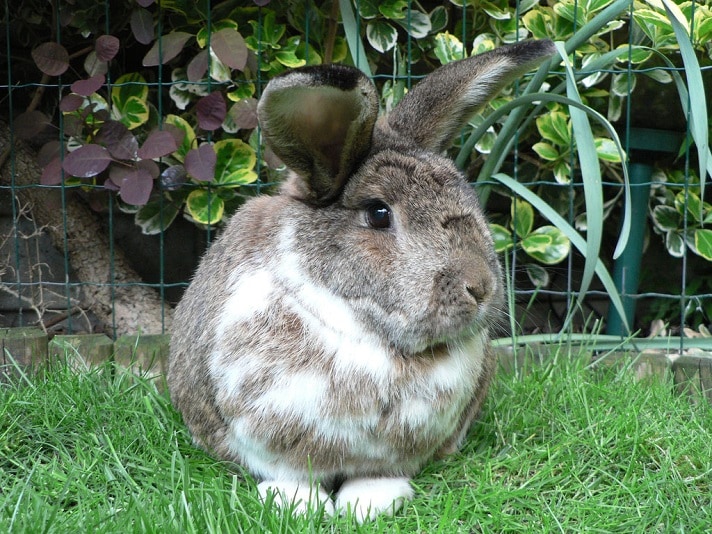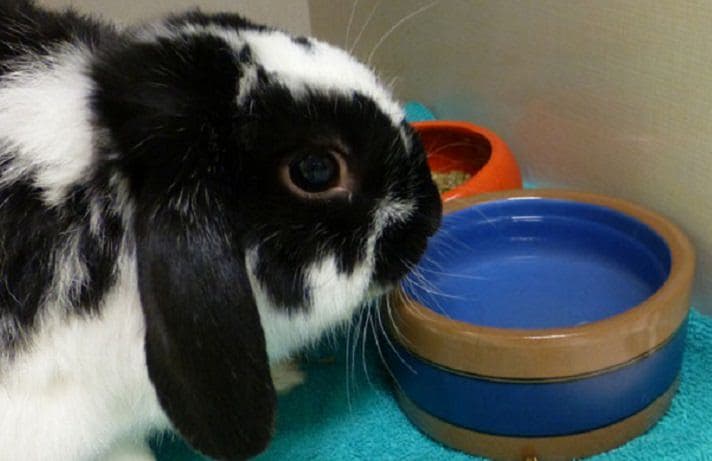After weeks of research, you finally have the rabbit you’ve always wanted. The cage is properly set up with clean water, rabbit toys, fresh food and plenty of hay. You’re ready to bond with your new pet … but suddenly–achoo!– you can’t stop sneezing and scratching at your eyes. Are you allergic to your rabbit?
An allergy is the body’s “abnormal reaction to substances normally tolerated,” says Dr. Dorothy Calebrese, an allergy specialist in California. Allergies are recognized by a runny nose, itchy eyes and throat, and/or skin rashes, such as hives. A person may have one or all of these symptoms. According to Calebrese, you’ll know it’s a cold and not allergies if it goes away in a few days or is accompanied by a fever. Approximately 15 percent of Americans are allergic to animals, said Calebrese. Genetics often plays a factor in whether someone has allergies or not. If one parent has allergies, then you might develop allergies. If both parents have allergies, you are highly likely to have allergies.
The Rabbit Allergy
With rabbits, most people are allergic to a protein in their saliva or dander (skin cells)–not the fur! As the rabbit grooms, its saliva is spread over its body. Petting or touching a rabbit, then your face, spreads these proteins to sensitive areas such as your nose and eyes. If you do not have allergies, nothing will happen. But, if you’re allergic to a particular protein, your body will try to fight it off, which will make you feel as if you have a cold.
So You’re Allergic To Your Rabbit — Now What?
According to Calebrese, only about one in five people who are allergic to their pets actually give them up. In fact, some studies suggest that having a companion pet can be healthy for you. Pets can have a calming effect, which lowers blood pressure. Furthermore, early exposure to animals may lead to an earlier diagnosis and treatment for allergies.
“Diagnosis and treatment is the trick,” says Calebrese. There are some extreme allergy cases in which it may be best for the person to remove the rabbit entirely. These situations may include reoccurring skin rashes, chronic fatigue, bronchitis or other respiratory issues such as asthma. However, by implementing good hygiene, giving up your rabbit may be avoidable.
It’s an “individual situation,” says Dr. Susan Smith, a professor in the Department of Nutrition at the University of Wisconsin–Madison and scientific advisor and fosterer for the House Rabbit Society. “I know asthmatics with bunnies, I know asthmatics without bunnies.” “People need to do what’s best for them,” Calebrese adds. If you or another family member is allergic to your rabbit, but you want to keep it, try the following steps to minimize your discomfort:
Step 1: Regular Grooming
“With all rabbits, get in the habit of grooming them on a daily basis, five minutes a day,” advises Margaret A. Wissman, DVM, DABVP–Avian from Florida. However, the person with allergies should not be the primary groomer, and/or he or she should wear a mask when grooming the rabbit.
Step 2: Restrict your rabbit’s movement in the house.
Keep at least one room “rabbit free,” as well as the bedroom, where you probably spend 8 to 10 hours of your day.
Step 3: A pet shampoo formulated for use on rabbits might help.
Wissman cautions against using human shampoos, which are too harsh for a rabbit, or overbathing. Rabbits “should only be bathed on occasion, not routinely,” Wissman advised.
Step 4: Use common sense while handling a rabbit.
“Don’t put your face right in the bunny fur. Your immune system is sitting right there. You want to keep the rabbit dander away from those regions,” Smith cautioned.
The Right Breed For You
Calebrese, along with the rest of her family, is allergic to a variety of animals, including rabbits. Yet, she counts many animals among her household companions, including a Blue Holland Lop.
“We just took our time choosing a breed,” she said. Although this breed of rabbit worked for Calebrese’s family, each person must discover which breed works for them.
As a general rule, however, an Angora rabbit is probably not the best choice for someone with allergies. An Angora, or other longhaired rabbit, needs additional grooming and, therefore, will shed more dander, collect more dust, and lick its fur more often, thus spreading the saliva protein. Smith cites the Rex breed as having a lower shed count than an Angora.
To determine which breed is right for you, spend time with various types of rabbits, or offer to foster or pet-sit a rabbit in order to gain exposure to a variety of breeds. If you’ve had extreme allergies in the past, a visit to an allergist might be a good idea — a specialist can test for specific allergens.
Is An Allergy To One Animal An Allergy To All?
What if you’re thinking of adopting that adorable rabbit you saw last week, but you already know that you’re allergic to cats and dogs? Will you be allergic to a rabbit too? “Immune systems are very specific. An allergy to one species doesn’t necessarily mean to another,” Smith explained. Smith is highly allergic to guinea pigs and cats, somewhat allergic to dogs and hay, but not at all to rabbits. To combat her hay allergy she uses caution while handling it. “Rabbits are a great alternative to cats,” Calebrese said, because cats are one of the main sources of pet allergies.
Like this article? Please share it, and check out:
By: Rose Gordon Sala
Share:









